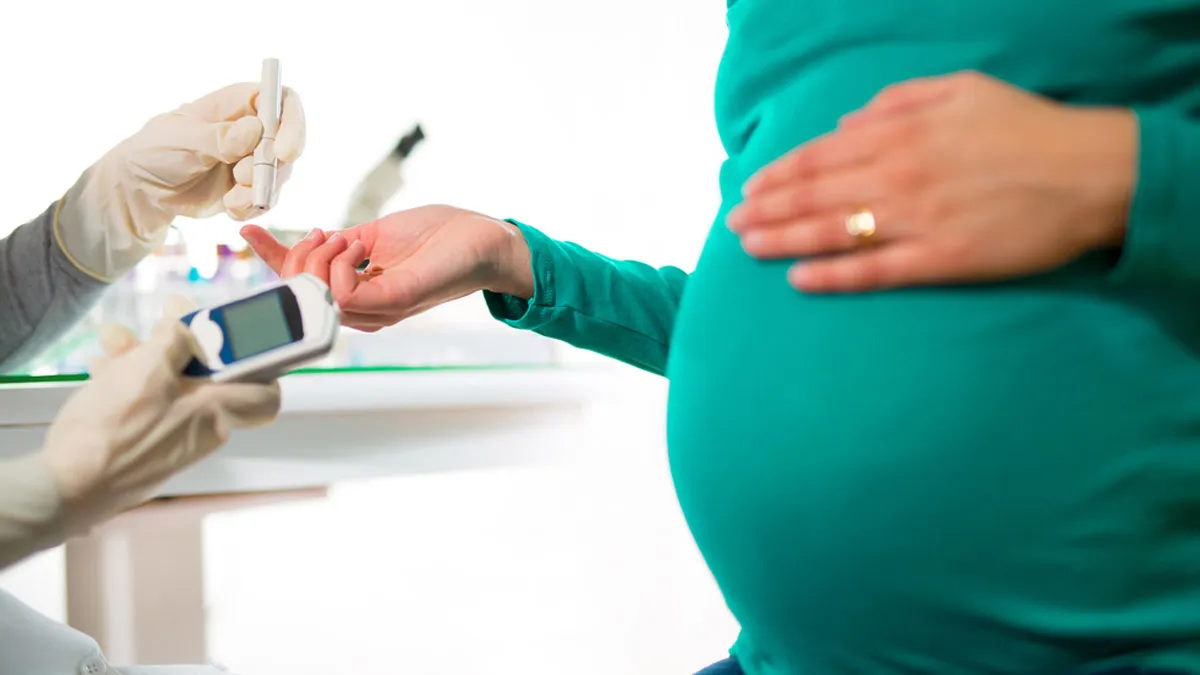
Getting pregnant is an exciting time, but if you have diabetes or get it during pregnancy, there are extra things to think about. It's really important to know how diabetes and pregnancy affect each other so you can both stay healthy.
Table of Content:-
In an exclusive interaction with the editorial team of Onlymyhealth, Dr Bhumesh Tyagi, Consultant, General Medicine and Physician, Shardacare, Health City, Noida, explained the link between diabetes and pregnancy. Here is what he shared with us.
Link Between Diabetes and Pregnancy
Diabetes, whether you had it before getting pregnant (Type 1 or Type 2) or you get it during pregnancy (gestational diabetes), changes how your body uses sugar. During pregnancy, your body's hormones change a lot, which can mess with your blood sugar levels.
- If you already have diabetes: Your body already struggles to control blood sugar. Pregnancy hormones can make it even harder because they make your body resist insulin more.
- Gestational Diabetes (GDM): This type only happens during pregnancy in women who didn't have diabetes before. It's usually caused by pregnancy hormones blocking your insulin from working well. GDM often goes away after the baby is born, but it means you're more likely to get Type 2 diabetes later in life.
Also Read: Men are losing the Y Chromosome, Study Claims: What it Means for Men’s Health?
How Diabetes Can Affect the Mom
If diabetes isn't controlled during pregnancy, it can cause problems for the mother:
- High Blood Pressure (Preeclampsia): A serious condition that can hurt both mom and baby.
- More Infections: High blood sugar can weaken your body's defenses, making you more likely to get things like UTIs or yeast infections.
- Low Blood Sugar (Hypoglycemia): Your blood sugar can drop too low, making you feel dizzy or weak.
- Diabetic Ketoacidosis (DKA): A very dangerous condition where your body makes too much acid, which needs urgent medical help.
- Harder Labor and Delivery: Babies of moms with uncontrolled diabetes can be bigger, which might mean a C-section or a more difficult natural birth.
- Higher Risk of Type 2 Diabetes Later: Especially if you had gestational diabetes, you're more likely to get Type 2 diabetes within 5-10 years after your baby is born.
Also Read: What Are Lysosomal Storage Disorders? Expert Shares Causes, Complications, and Treatment Options
How Diabetes Can Affect the Baby
The baby growing inside you is very sensitive to uncontrolled diabetes in the mother:
- Big Baby (Macrosomia): Too much sugar from the mom goes to the baby, making the baby produce more insulin and grow too big. This can lead to birth injuries or breathing problems.
- Birth Defects: High blood sugar early in pregnancy can increase the risk of problems with the baby's heart, brain, or spine.
- Early Birth: Diabetes can sometimes cause babies to be born too soon.
- Breathing Problems: Even if born at full term, babies of diabetic moms might have lungs that aren't fully ready, leading to breathing issues.
- Low Blood Sugar After Birth: After birth, the baby still makes a lot of insulin but isn't getting sugar from the mom anymore, so their blood sugar can drop dangerously low.
- Yellow Skin (Jaundice): Babies might have more severe yellowing of the skin and eyes.
- Higher Risk of Obesity and Type 2 Diabetes Later: Babies exposed to high blood sugar in the womb might be more likely to become overweight or get Type 2 diabetes when they're older.
Having a Healthy Pregnancy with Diabetes
The good news is that with good care, most women with diabetes can have healthy pregnancies and healthy babies. Here's what helps:
1. Plan Before You Get Pregnant
- Get Blood Sugar Under Control: Try to get your blood sugar to a healthy level before you get pregnant. This greatly lowers the risk of birth defects.
- Check Your Medicines: Talk to your doctor about all your medicines to make sure they're safe for pregnancy. Insulin is often the best choice for diabetes during pregnancy.
- Eat Well: Work with a dietitian to plan healthy meals.
2. During Pregnancy – Check Things Often:
- Check Blood Sugar a Lot: You'll need to check your blood sugar often to keep it in the right range.
- Eat Healthy: Stick to a balanced diet with whole foods, lean meats, and good fats. Avoid sugary drinks and white bread/pasta.
- Stay Active: If your doctor says it's okay, do some moderate exercise; it helps control blood sugar.
- Check on the Baby: Your doctor will likely do more ultrasounds and tests to make sure the baby is growing well.
- Work with Your Team: You'll work closely with doctors, dietitians, and diabetes educators.
3. After the Baby is Born
- For Gestational Diabetes: Get tested for Type 2 diabetes 6-12 weeks after birth and keep getting regular check-ups.
- For Existing Diabetes: Your insulin needs will change after birth. Keep checking your blood sugar and work with your doctor to adjust your medicine.
- Breastfeed: Breastfeeding is good for both mom and baby, and it can help moms with gestational diabetes control their blood sugar.
Bottomline
Even though the thought of diabetes affecting pregnancy can be scary, knowing about it is the first step to feeling in control. By working closely with your doctors, making healthy lifestyle changes, and carefully managing your blood sugar, you can greatly lower the risks. You're not alone – a whole team is ready to support you in bringing your healthy new baby into the world!
Also watch this video
Read Next
Is It Safe to Use a Laptop on Your Lap While Pregnant? Expert Shares Health Risks and Safety Tips
How we keep this article up to date:
We work with experts and keep a close eye on the latest in health and wellness. Whenever there is a new research or helpful information, we update our articles with accurate and useful advice.
Current Version
